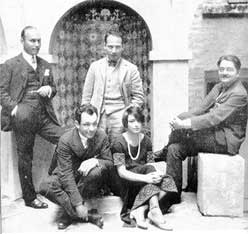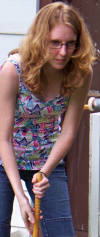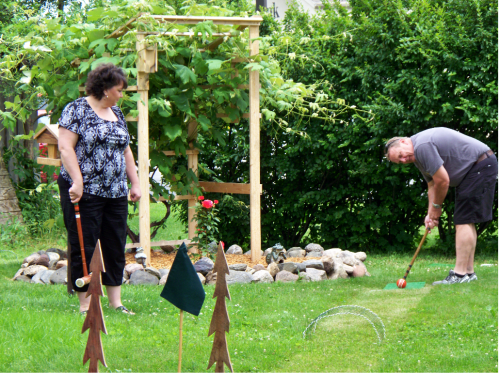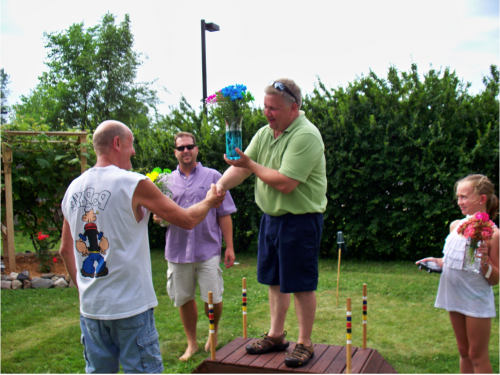Theme Essay by Mevia Gappa
The Algonquin Round Table and the Greater Gappa Open
In the 1920s, croquet was the favorite weekend pastime for the members of the famed Algonquin Round Table. The group—which included Dorothy Parker, Alexander Woollcott, Edna Ferber, Harpo Marx, and other luminaries—played so often, they ended up setting the rules of the game in America.
 The Round Table members may have influenced the way croquet was played around the nation, but my family is proud of having revised the game for our own enjoyment.
The Round Table members may have influenced the way croquet was played around the nation, but my family is proud of having revised the game for our own enjoyment.
At our annual event, the Greater Gappa Open—GGO for short—we don’t play croquet in the original way, where bouncing a ball out of play occurs on a regular basis. Instead, we play a game that’s more like miniature golf.
The lowest score wins, and, let’s face it, hitting your ball into another person’s ball doesn’t always benefit you. You could stop dead in your tracks and get stuck directly behind that opponent, thus adding another precious stroke onto your game.
We still use wickets, but we divide them into a miniature golf course. Players move from one “hole” to another and hit the ball through one wicket at a time. After each successful hit, the ball is picked up and carried to the next hole. There are hazards to avoid on each hole. Whether it’s rocks to hit between or wire cages to roll through, there is bound to be something that will trip up each player. Crossing homemade bridges is a hazard that has been retired in recent years due to frustration.
My family doesn’t joke about the GGO. It’s a competitors’ weekend.
The Algonquin Round Table was the same way. Its members were fiercely competitive and spent hours challenging each other at croquet.
The games had no limits. Once, Alexander Woollcott sent Harpo Marx’s ball flying into the woods for a third time, and Bea Kaufman subsequently found Harpo sobbing against a tree. On another occasion, the entire Round Table stopped speaking to Harold Ross for almost a week because he nudged his ball with his foot. When they caught him in the act, he innocently asked: “But aren’t you supposed to?” This act of innocence was more upsetting to the group than the obvious cheating.
We Gappas play all day for hours on end, taking score and standing watch over each other’s games.
When someone finally reaches hole number nine, the final hole and home to the “hole-in-one prize”—usually a car or beach vacation, nothing too major—the rest of us stop wherever we are and hold our collective breath as the player takes a swing. When the ball flies off course, we all breathe again. Did I mention the prize is a toy car or a hand-crafted beach vacation?
Like I said, fierce competition.
It sometimes seems to me that writing is a fierce competition as well—clearly not as fierce as a croquet weekend with my family or with Dorothy Parker, but competitive just the same. I often find myself reading books or short stories and saying to myself, “I was going to write something like that. Now what do I do?”
Well, there are two options here: Dive into the competition and write it better. Or forget about the story, grab a wooden mallet, and smack a ball clear across the yard. Croquet as a way to ignore writer’s block? Is that why the Algonquin Round Table played so much? Could be.
It could also simply be that the members of the Round Table enjoyed each other’s company, whether on the croquet lawn or off. They spent hours together, and many worked on projects with each other. Their competitions and practical jokes were in jest, as they are for my family. We all put our game faces on for a split second before the laughter peals out from deep inside. The narrowed eyes and stare-downs are all in fun.
That’s what it should be. Writing, as well. Face the competition, but never forget that the people we compete against are also our colleagues.
If I ever win the GGO, I will smile proudly. I’ll show a quiet satisfaction in being the first female in the family to take the winning trophy. (We do have a trophy—The Broken Mallet Award—for the worst score, but I’ve managed to stay away from that one and don’t plan to “win” it any time soon.)
Don’t get me wrong: I’ll be jumping for joy on the inside, as I will when I publish my first novel or short story. But I won’t want to rub it in—with my writer friends or particularly with my competitors in the Greater Gappa Open. Goodness knows, the men in my family wouldn’t know what to do if one of the underdogs took the competition.
Additional Resources
- “Why They Say It’s Okay to Cheat at Croquet” by David H Drazin, Croquet World Online Magazine (July 27, 2008): Anecdotes about the croquet playing of Alexander Woollcott and other members of the Algonquin Round Table.
Art Information
- "Obstacle Course at the 2011 Greater Gappa Open" and "First Prize Winner of the 2011 Greater Gappa Open" © Mevia Gappa; used by permission
- "Algonquin Round Table: Portrait of Art Samuels, Charlie MacArthur, Harpo Marx, Dorothy Parker, and Alexander Woollcott" ca. 1919; public domain
 Mevia Gappa is an editorial assistant at Talking Writing.
Mevia Gappa is an editorial assistant at Talking Writing.
A senior at the University of Wisconsin at Green Bay, she is majoring in English with an emphasis in creative writing. She is assistant editor-in-chief of the Sheepshead Review, the campus journal of the arts, and also works for the university’s Archives and Area Research Center.
When not participating in the Greater Gappa Open, Mevia is spending the summer counseling at a Christian camp in the Upper Peninsula of Michigan, chasing around her young sister, and traveling to see family.


